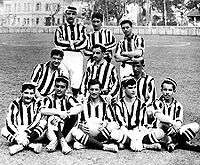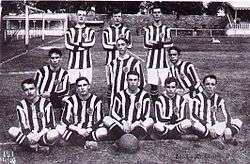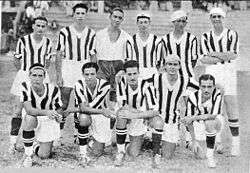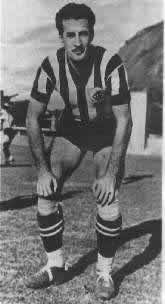Botafogo de Futebol e Regatas
Botafogo de Futebol e Regatas (Portuguese pronunciation: [bɔtaˈfoɡu dʒi futʃiˈbɔw i ʁeˈɡataʃ]; Botafogo Football and Rowing), also known as Botafogo, is a Brazilian sports club based in Botafogo, Rio de Janeiro. Although they compete in a number of different sports, Botafogo is mostly known for its association football team. It plays in the Campeonato Brasileiro Série A, the first tier of the Brazilian football league system, and in the state of Rio de Janeiro's premier state league. In 2000, Botafogo finished 12th in a vote by subscribers of FIFA Magazine for the FIFA Club of the Century.[2][3]
 | ||||
| Full name | Botafogo de Futebol e Regatas | |||
|---|---|---|---|---|
| Nickname(s) | Fogão (The Big Fire) A Estrela Solitária (The Lone Star) O Glorioso (The Glorious One) | |||
| Founded | July 1, 1894, as a rowing club August 12, 1904, as a football club | |||
| Ground | Estádio Nilton Santos | |||
| Capacity | 46,831[1] | |||
| President | Nelson Muffarej | |||
| Head coach | Paulo Autuori | |||
| League | Campeonato Brasileiro Série A Campeonato Carioca | |||
| 2019 2019 | Série A, 15th Carioca, 8th | |||
| Website | Club website | |||
|
| ||||
In addition, the club has some of Brazilian football's most notable records, as the largest number of unbeaten matches: 52 games between 1977 and 1978; the most unbeaten matches record in the Brazilian Championship games: 42, also between 1977 and 1978; the largest number of player participations in total matches of the Brazil national football team (considering official and unofficial games): 1,094 participations and the largest number of players assigned to the Brazilian national team for World Cup. The club is still responsible for the greatest victory ever recorded in Brazilian football: 24-0 against Sport Club Mangueira in 1909.
History
Formation and merger
On July 1, 1894, Club de Regatas Botafogo was founded.[4]

On August 12, 1904, another club was founded in the neighborhood: the Electro Club, the name first given to the Botafogo Football Club. The idea came during an algebra lesson at Alfredo Gomes College, when Flávio Ramos wrote to his friend Emmanuel Sodré: "Itamar has a football club in Martins Ferreira Street. Let's establish another one, in Largo dos Leões, what do you think? We can speak to the Wernecks, to Arthur César, Vicente and Jacques". The Electro Club was founded, but its name did not last. After a suggestion from Dona Chiquitota, Flávio's grandmother, the club finally became the Botafogo Football Club, on September 18 of the same year. The colors were black and white like those of Juventus FC, the team of Itamar Tavares, one of the club's founders. Its badge was drawn by Basílio Vianna Jr., in Swiss style with the BFC monogram. The Botafogo Football Club would soon become one of the strongest football teams in Rio de Janeiro, winning the championships of 1907, 1910, 1912 and more.[5]
With the same name, the same location, the same colours and most important the same supporters, it seemed inevitable that the clubs would merge. They did so on December 8, 1942 after a basketball match between both clubs, when Botafogo Football Club player Armando Albano died suddenly, that the idea of a merger began. On this tragic occasion, the president of Club de Regatas Botafogo, Augusto Frederico Schmidt (also a major Brazilian poet), spoke: "At this time, I declare to Albano that his last match ended with the victory of his team. We won't play the time left on the clock. We all want the young fighter to leave this great night as a winner. This is how we salute him." Eduardo Góis Trindade, Botafogo Football Club's president said: "Between the matches of our clubs, only one can be the winner: Botafogo!." And then Schmidt declared the fusion: "What else do we need to our clubs become one?." Botafogo de Futebol e Regatas finally came into being. The Football Club's badge became black, and the monogram substituted by Clube de Regatas' lone star.[6]
On the field


The team won the Campeonato Carioca in 1907, 1910 and 1912. In 1909 the team beat Mangueira 24–0, which remains the highest score in Brazilian football.[7] They won further state titles in 1930, 1932, 1933, 1934 and 1935.[8]

In the 1940s, after the creation of Botafogo de Futebol e Regatas, the team's best player was Heleno de Freitas. However, Heleno did not win a championship for Botafogo. He scored 204 goals in 233 matches, but went to the Boca Juniors in 1948, the year Botafogo won its 9th state championship.
They won the Campeonato Carioca in 1957, 1961 and 1962, and in 1968 they won Serie A, becoming the first carioca club to win the Brazilian league.[9]
1989 ended a period of 21 years without a title when the club won the state championship, retaining the trophy in 1990.[9]
In the 1990s, Botafogo won Copa Conmebol (the precursor of the current Copa Sudamericana).[10] And in 1995 they won the Brazilian League for the second time in club's history, after drawing 1–1 the second leg of the Final against Santos FC at São Paulo.
Botafogo would be relegated to the Second Division after ranking last in the Brazilian League of 2002. In 2003, Botafogo ranked second in Brazil's Second division (after Palmeiras) and returned to the First Division.
In 2006, the club won the Rio de Janeiro State Championship for the 18th time, and again in 2010 and 2013 with the iconic players Loco Abreu and Seedorf, respectively.
Nowadays, Botafogo is the only club to have won titles in three different centuries, including the state championship for rowing in 1899.
Stadium
.jpg)
The team's home ground is the Estádio Olímpico Nilton Santos, named in honor of Nilton Santos, a former club player and two time world champion with the Brazilian national football team, and some feel the greatest left back of all time, .[11]
Other stadiums used by the club during its history are:
- Voluntários da Pátria Street Field, the club's first pitch at their origins neighborhood.
- Estádio General Severiano, the club's first own stadium.
- Marechal Hermes Stadium, less important matches during 1978-1986.
- Estádio Caio Martins, at the neighboring city of Niterói.
- Estádio Luso Brasileiro during the 2005 and 2016 seasons.
Rivals
Its biggest rivals are the other most important Rio clubs: Fluminense, Flamengo, and Vasco da Gama.
The derby with Fluminense is known as the "Clássico Vovô" (Grandfather Derby) because it is the oldest derby in the whole country. Both teams faced each other for the first time in 1905.
The match with Vasco is known as the "Friendship Derby" because the supporters of both club have been friends historically. It is the only derby in the city that tends to be nonviolent.
The derby against Flamengo, "The Rivalry Derby", is the biggest one for the club, and one of the more important for the country. The clubs strongly dislike each other and the rivalry goes from the players on the pitch, to the fans, to both clubs' boardrooms. Players who participate in these matches usually become club idols. Some examples include: Garrincha, Manga, Jairzinho, Túlio Maravilha, and more recently Loco Abreu and Jefferson. Manga is known for a remarkable quote about this derby when he used to say that the player's prize money was already guaranteed because it was easy to beat Flamengo. Flamengo's biggest star Zico once said that at his childhood, Botafogo was the club he hated more because the Glorioso used to win all the derbies.
From outside the city, the club has had a historic rivalry with Santos FC since the 1960s.
Supporters
Botafogo is in the top 10 of Brazil's largest fanbases; it is the third-most popular club in the state of Rio de Janeiro, behind only Flamengo and Vasco. However, most of the club's supporters are located outside the state of Rio de Janeiro; it has numerous fans in all parts of the country, especially in the state of Minas Gerais, on Espírito Santo, in the northeast region of Brazil, and in Brazil's capital city Brasília.
Symbols

Lone Star
The Lone Star (Estrela Solitária) is currently present in Botafogo's flag and crest. This star was the principal symbol of Club de Regatas Botafogo. After the two Botafogos merged, the Lone Star became one of the most important symbols of Botafogo's football team.
Flag
The old flag of Club de Regatas Botafogo was white with a small black square which contained the Lone Star. The Football Club had a flag with nine black and white stripes with the club's crest localized in the center. Botafogo de Futebol e Regatas then based its flag on that of the two old clubs. The flag has five black and four white stripes, with a black square at the upper left side with the Lone Star.
Uniform
Their primary uniform consists of a black jersey with vertical white stripes, black shorts and grey socks. Their secondary uniform is all white. An all black uniform may also be used. The socks, although traditionally grey, may also be black or even white on rare occasions.
Mascots
In 1948 a stray dog named Biriba, known for urinating on the players, was the mascot that led them to the Campeonato Carioca.[12] For some time before the adoption of Manequinho as mascot, Donald Duck was Botafogo's mascot as he represented the fans' fiery temper (as well as, notoriously, 1940s idol Heleno de Freitas). Because of image rights problems with the Walt Disney Company, Donald did not become an official mascot.
Financial situation
In 2006 Botafogo had Supergasbras and Alê as sponsors, the arrangement during that year earned the team $3.2 million (R$7.2 million).[13] The next year, Botafogo managed to sign the sixth highest sponsorship deal in Brazil[14] the new sponsor Liquigás, a Petrobrás subsidiary paid the club $3.9 million (R$7.8 million) under the terms of the one-year contract.[13] In 2008 not only was the agreement with Liquigás renewed for another year, but it also became more lucrative since the sponsorship was raised to around $5 million (R$10.2 million).[15]
In 2007, Botafogo generated the 12th largest amount of revenue for all Brazilian Football clubs— a total $20.8 million (or R$41.1 million) but Botafogo had a net loss of $1.9 million (or R$3.7 million).[16][17] Also at the end of 2007 Botafogo had total debts of $106.1 million (or R$209.7 million).[18]
Honours
The club has some of Brazilian football's top records, as the largest number of unbeaten matches: 52 games between 1977 and 1978;[19] the matches unbeaten record in the Brazilian Championship games: 42, also between 1977 and 1978;[20] the largest number of player participations in total matches of the Brazil national football team (considering official and unofficial games): 1,094 participations[21] and the largest number of players assigned to the Brazilian national team for World Cup.[22]
International
- Small World Cup: 3
- Winners: 1967
- Winners: 1968
- Winners: 1970
- Winners: 1993
- Runners-up: 1994
National
Regional
- Torneio Rio-São Paulo: 4
- Winners: 1962, 1964, 1966, 1998
- Taça Brasil South Zone:
- Winners: 1968
- Runners-up: 1962
- Winners: 1967, 1968, 1997, 2006, 2009, 2010, 2013, 2015
- Taça Rio: 9
- Winners: 1975, 1976, 1989, 1997, 2007, 2008, 2010, 2012, 2013
(*)The only to win four times in a row.
International Tournaments
- Tournoi de Paris : (1) 1963
- Teresa Herrera Trophy : (1) 1996
Current squad
- As of 5 March 2020[24]
Note: Flags indicate national team as defined under FIFA eligibility rules. Players may hold more than one non-FIFA nationality.
|
|
Out on loan
Note: Flags indicate national team as defined under FIFA eligibility rules. Players may hold more than one non-FIFA nationality.
|
|
Records
| World Best Players | |||||||||||||
| # | Name | Year | |||||||||||
| 1. | 1958 | ||||||||||||
| 2. | 1962 | ||||||||||||

| Most appearances | |||||||||||||
| # | Name | Matches | Goals | Year | |||||||||
| 1. | 723 | 11 | 1948–64 | ||||||||||
| 2. | 612 | 243 | 1953–65 | ||||||||||
| 3. | 459 | * | 2003–2005 and 2009–2018 | ||||||||||
| 4. | 453 | 6 | 1967–76 | ||||||||||
| 5. | 444 | 306 | 1954–64 | ||||||||||
| 6. | 442 | 394* | 1959–68 | ||||||||||
| 7. | 442 | 15 | 1967–76 | ||||||||||
| 8. | 422 | 115 | 1940–54 | ||||||||||
| 9. | 413 | 186 | 1962–74, 1981 | ||||||||||
| 10. | 412 | 503* | 1993–02 | ||||||||||
| 11. | 387 | 4 | 1970–79 | ||||||||||
| 12. | 384 | 12 | 1946–57 | ||||||||||
| 13. | 371 | 2 | 1945–56 | ||||||||||
| 14. | 354 | 13 | 1987–90, 1994–96 | ||||||||||
| 15. | 352 | 154 | 1962–73 | ||||||||||
| 16. | 347 | 27 | 1955–62 | ||||||||||
| 17. | 340 | 116 | 1975–82 | ||||||||||
| * goalkeeper. | |||||||||||||
| Most goals | |||||||||||||
| # | Name | Goals | Matches | G/M | |||||||||
| 1. | 306 | 444 | 0,68 | ||||||||||
| 2. | 261 | 303 | 0,86 | ||||||||||
| 3. | 243 | 612 | 0,39 | ||||||||||
| 4. | 209 | 235 | 0,88 | ||||||||||
| 5. | 190 | 201 | 0,94 | ||||||||||
| 6. | 186 | 413 | 0,45 | ||||||||||
| 7. | 171 | 200 | 0,85 | ||||||||||
| 8. | 159 | 223 | 0,71 | ||||||||||
| 9. | 154 | 352 | 0,43 | ||||||||||
| 10. | 144 | 176 | 0,81 | ||||||||||
| 11. | 136 | 231 | 0,58 | ||||||||||
| 12. | 135 | 206 | 0,65 | ||||||||||
| 13. | 127 | 301 | 0,42 | ||||||||||
| 14. | 116 | 340 | 0,34 | ||||||||||
| 15. | 115 | 422 | 0,27 | ||||||||||
| 16. | 114 | 313 | 0,36 | ||||||||||
| 17. | 110 | 174 | 0,63 | ||||||||||
| 18. | 105 | 158 | 0,66 | ||||||||||
| 19. | 102 | 242 | 0,42 | ||||||||||
| 20. | 96 | 248 | 0,39 | ||||||||||
- Note: numbers do not count matches played in Torneio Início.
- Source: RSSSF Brasil – Botafogo
Managers
|
|
|
Notes
Other Sports
Basketball
- Botafogo Basketball
References
- "Archived copy". Archived from the original on February 2, 2017. Retrieved January 29, 2017.CS1 maint: archived copy as title (link)
- "The FIFA Club of the Century" (PDF). FIFA. Archived from the original (PDF) on April 23, 2007. Retrieved August 11, 2016.
- "FIFA World Player 2000 award information". FIFA.com. December 6, 2000. Archived from the original on December 19, 2016. Retrieved July 7, 2017.
- "History". Botafogo de Futebol e Regatas. Archived from the original on November 19, 2013. Retrieved November 19, 2013.
- "De como o Eletro Club tornou-se Botafogo". Gazeta Esportiva. Archived from the original on August 16, 2004. Retrieved October 7, 2007.
- "História – A união dos dois clubes fez nascer um dos times de maior tradição no Brasil". Botafogo de Futebol e Regatas official website. Archived from the original on August 6, 2007. Retrieved October 7, 2007.
- "Maior goleada da história do futebol brasileiro completa um século". GloboEsporte.com. May 25, 2009. Retrieved July 27, 2014.
- "Botafogo: Fogão flames burn eternal". Clubs. FIFA. Archived from the original on March 26, 2013. Retrieved February 28, 2013.
- "Botafogo FR: Trophies". Soccerway. Perform. Archived from the original on May 17, 2014. Retrieved May 16, 2014.
- Rsssf.com Archived February 1, 2010, at the Wayback Machine
- "Botafogo FR". Soccerway. Perform. Archived from the original on October 17, 2015. Retrieved August 30, 2015.
- "Maybe Brazil Needs a Pitch Invading Dog". www.theguardian.com. The Guardian. Archived from the original on July 4, 2014. Retrieved July 4, 2014.
- "Botafogo anuncia novo patrocínio nesta sexta – Terra – Rio de Janeiro". Esportes.terra.com.br. Archived from the original on January 9, 2010. Retrieved May 15, 2010.
- "GloboEsporte.com > Futebol > Corinthians – NOTÍCIAS – Manga pertence 85% à Medial Saúde". Globoesporte.globo.com. January 24, 2008. Archived from the original on January 26, 2009. Retrieved May 15, 2010.
- Gustavo Rotstein Do GLOBOESPORTE.COM, no Rio de Janeiro (May 7, 2010). "GloboEsporte.com > Futebol > Botafogo – NOTÍCIAS – Clube pagará salários atrasados na próxima segunda". Globoesporte.globo.com. Archived from the original on December 28, 2008. Retrieved May 15, 2010.
- "Clubes Brasileiros fecham 2007 no vermelho « Written World". Thewrittenworld.wordpress.com. July 18, 2008. Archived from the original on March 25, 2011. Retrieved May 15, 2010.
- Archived December 28, 2008, at the Wayback Machine
- GLOBOESPORTE.COM Rio de Janeiro (May 7, 2010). "Globoesporte.com > Futebol – NOTÍCIAS – Brasileiros fecham 2007 no vermelho". Globoesporte.globo.com. Archived from the original on February 3, 2009. Retrieved May 15, 2010.
- "Botafogo 1x0 Flamengo - Jogo da invencibilidade (1979)". Rádio Botafogo. July 18, 2011. Archived from the original on March 8, 2016. Retrieved August 11, 2016.
- "Botafogo é recordista de invencibilidade no futebol brasileiro". Fala Glorioso. September 17, 2014. Archived from the original on August 11, 2014. Retrieved July 27, 2014.
- "Jogadores cedidos por clube na história da Seleção Brasileira". RSSSF Brasil. Archived from the original on October 1, 2015. Retrieved November 18, 2015.
- "Copa: Botafogo segue líder entre clubes que mais cederam jogadores à Seleção". GloboEsporte.com. May 7, 2014. Retrieved May 7, 2014.
- "CBF oficializa títulos nacionais de 1959 a 70 com homenagem a Pelé" (in Portuguese). Globo. December 22, 2010. Archived from the original on October 14, 2012. Retrieved October 16, 2012.
- "footballzz.co.uk". footballzz.co.uk. September 19, 2010. Archived from the original on October 17, 2015. Retrieved September 19, 2010.
External links
| Wikimedia Commons has media related to Botafogo de Futebol e Regatas. |
| Look up Botafogo in Wiktionary, the free dictionary. |
